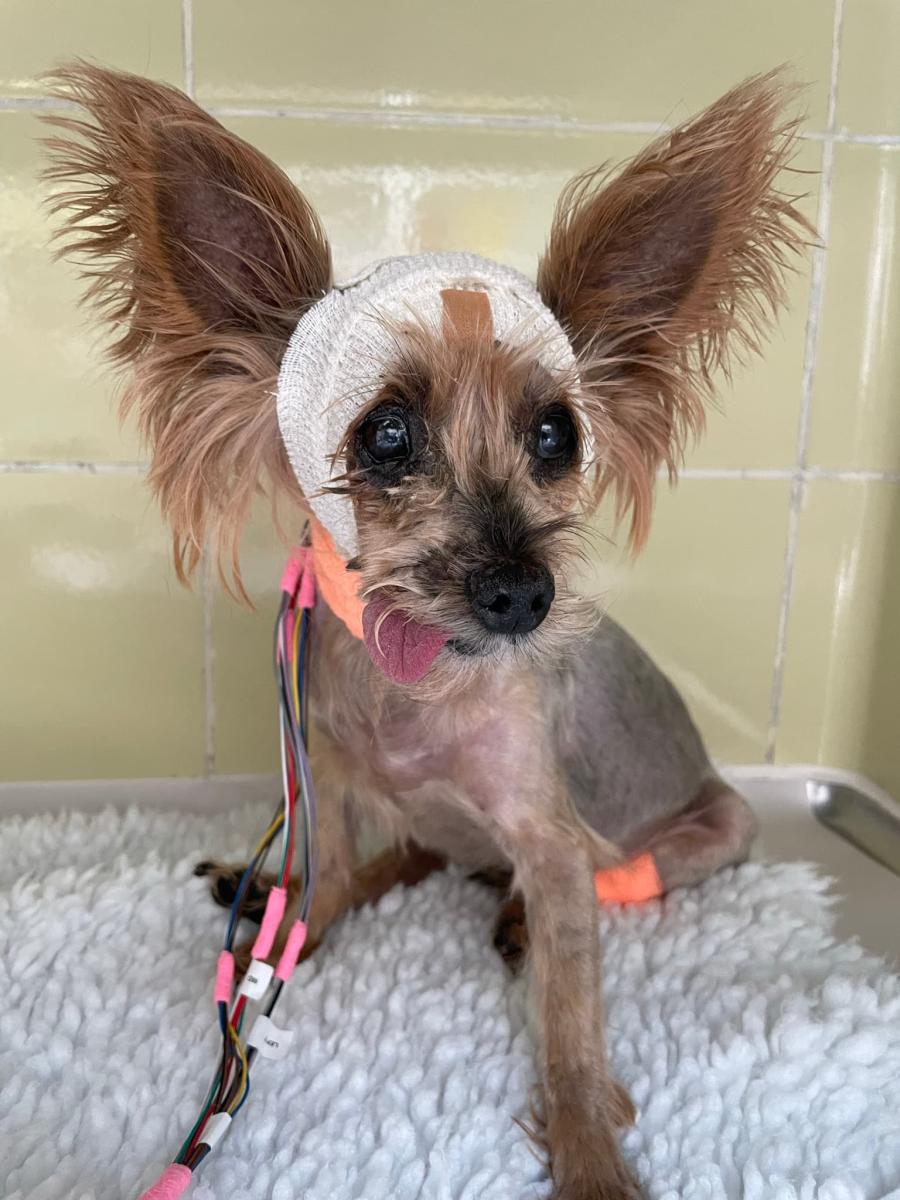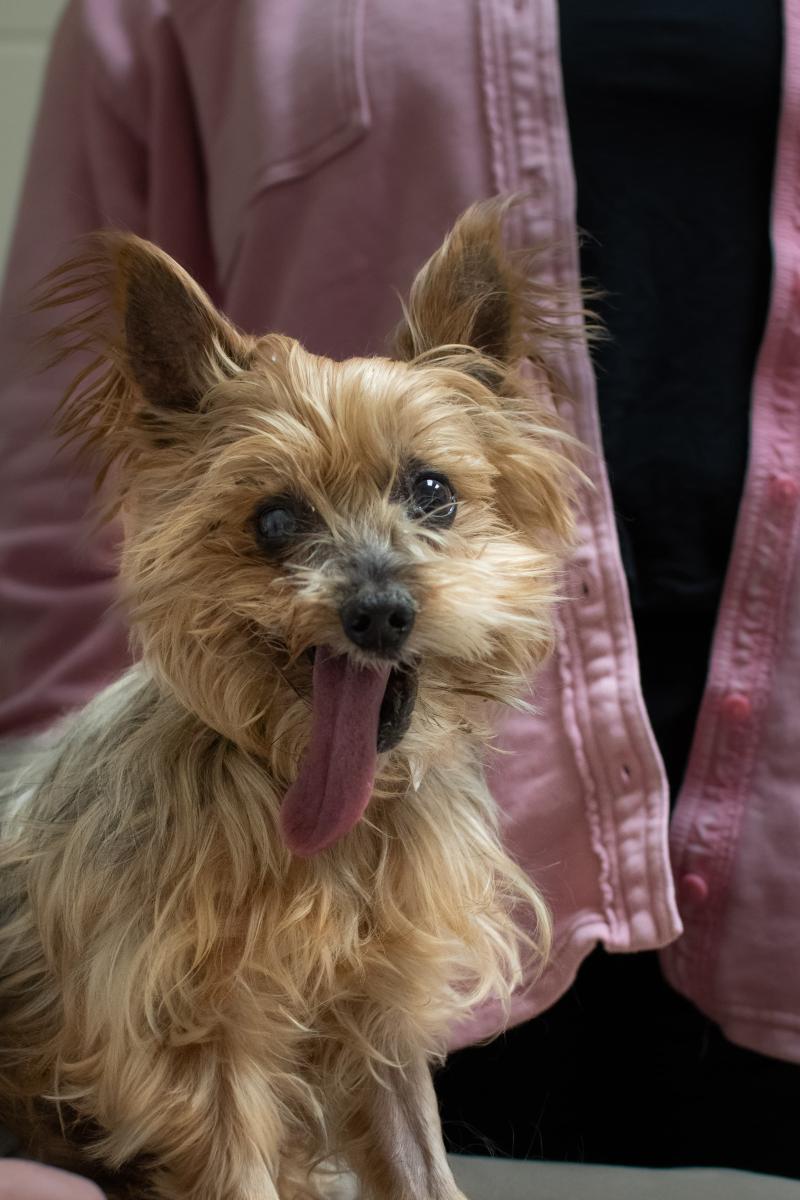By age 14, most dogs know a thing or two about veterinary visits. But few are as experienced as Toby, a 14-year-old Yorkshire terrier who has quickly become one of the most well-known patients at the Ontario Veterinary College (OVC) Health Sciences Centre (HSC).
 Toby is one of many pets who has benefitted from OVC’s Clinical Trials program. He came to OVC in March 2022 after experiencing unusual episodes at home. Sometimes, upon waking or hearing a sudden noise, Toby would startle and lose his balance. To explore potential causes for the episodes, Toby’s family veterinarian referred him to OVC for an MRI with the Neurology Service.
Toby is one of many pets who has benefitted from OVC’s Clinical Trials program. He came to OVC in March 2022 after experiencing unusual episodes at home. Sometimes, upon waking or hearing a sudden noise, Toby would startle and lose his balance. To explore potential causes for the episodes, Toby’s family veterinarian referred him to OVC for an MRI with the Neurology Service.
That MRI would begin an unexpected and invaluable journey at OVC for Toby and his owners, Lisa and Ryan.
Toby’s MRI showed no obvious changes in his brain to explain his startle episodes, and veterinarians recommended that he enroll in an ongoing study with OVC’s Clinical Trials team that uses Electroencephalography (EEG) to assess whether ’seizure-like’ episodes are actually seizures. Before he could enroll, however, his owners had to address an unexpected and serious finding on his MRI: a malignant carotid body tumour (a cancerous growth in the blood vessels near the carotid arteries).
OVC’s Oncology Team took over Toby’s care and successfully removed the mass; however, Toby’s episodes worsened after surgery. Triggered by stimuli such as a door opening or sudden movements, he was now having 10 to 15 episodes per day.
Lisa and Ryan decided it was time to enroll Toby in the EEG study led by Dr. Fiona James, associate professor in the Department of Clinical Studies, veterinary neurology specialist and director of the Comparative Epilepsy Program at OVC. Charly McKenna, a PhD student in James’ lab, runs the study and uses video recording and EEG, a non- invasive test that measures electrical activity in the brain using small electrodes.
Funded by OVC Pet Trust, the Natural Sciences and Engineering Research Council of Canada (NSERC) and the American Kennel Club (AKC) Canine Health Foundation, the study accepts dogs between six months and six years of age experiencing episodes resembling seizures. The study aims to confirm whether seizure activity is happening, classify the types of seizures dogs may be experiencing, and see how well they respond to therapy.
“Seizures are one of the most common neurological problems in veterinary medicine, and epilepsy is the most common brain disease in dogs,” says James. “Diagnosing epilepsy can be challenging because pets may experience many types of non- epileptic events. Further, some movement or behavioural disorders can be mistaken for epilepsy. But diagnostic clarity is important, as true seizures often require treatment.”
 In May 2022, Toby arrived at OVC for an EEG with James’ research team. A neurological exam was performed to assess his mentation, gait, posture and reflexes. To ensure Toby’s comfort and mitigate concerns surrounding his other health issues, he was sedated with the assistance of the OVC Anesthesia Service. While sedated, small acupuncture-like needles were used to place 12 electrodes into his scalp, which were bandaged in place. When Toby awoke, he had multiple seizure-like episodes, which were captured on the EEG and video recording. His observation period lasted two hours, after which the electrodes and bandaging were removed.
In May 2022, Toby arrived at OVC for an EEG with James’ research team. A neurological exam was performed to assess his mentation, gait, posture and reflexes. To ensure Toby’s comfort and mitigate concerns surrounding his other health issues, he was sedated with the assistance of the OVC Anesthesia Service. While sedated, small acupuncture-like needles were used to place 12 electrodes into his scalp, which were bandaged in place. When Toby awoke, he had multiple seizure-like episodes, which were captured on the EEG and video recording. His observation period lasted two hours, after which the electrodes and bandaging were removed.
Based on Toby’s EEG, he was diagnosed with epilepsy. His episodes were, in fact, seizures. Toby was prescribed an appropriate anti-seizure medication for his condition, and his episodes stopped within 24 hours.
Toby’s owners, Lisa and Ryan, were thrilled to have a clear diagnosis and path forward for their beloved canine companion.
“It’s wonderful that after just one dose of the proper medication, Toby is no longer having these troubling episodes,” says Lisa. “Thanks to this clinical trial, Toby was able to get the medication he needed and hopefully his participation will help other dogs who are experiencing the same thing.”
Despite this step forward in Toby’s journey, he would return to OVC a few days later for another emergency, unrelated to his previous visits. Toby experienced the acute onset of vestibular signs, including uncontrollable rolling. Toby had suffered a stroke. He was cared for by OVC’s Emergency and Neurology teams before returning home, where Lisa and Ryan helped Toby as he regained his ability to walk.
Since his first visit to OVC, Toby has been acquainted with nearly every team of OVC specialists: emergency and critical care, oncology, neurology, ophthalmology, internal medicine and clinical nutrition.
“Being nearly 15 years old, Toby has complex medical conditions that had to be considered during hospitalization and assessment for other, new problems,” explains Lisa. She says participating in the study – and having access to so many experts under one roof at OVC – helped her to make informed decisions about Toby’s care.
“Thanks to OVC’s specialized care, Toby pulled through his life-threatening conditions and made a full recovery. OVC has exceeded our expectations; we cannot thank everyone who was involved in Toby’s care enough.”
Toby is one of nearly 100 dogs who have participated in James’ study. Data and findings from her work will be shared in the coming months on the OVC Clinical Trials website.
About Clinical Trials at OVC
James’ studies are a subset of the many studies in OVC’s Clinical Trials program, which conducts research involving client-owned animals with the goal of advancing both animal and human health. Studies aim to increase our understanding of disease processes and identify the most effective therapies and practices for various conditions.
From cancers to cardiac diseases to psychiatric disorders, companion animals and humans share many diseases, and they live in the same complex environments. For these reasons, naturally occurring diseases in companion animals present an almost perfect model for the development of new disease treatments.
At any time, there are over 30 studies recruiting for various conditions, and more than 400 companion animals participate each year.
“As a part-time graduate student and the research manager of the Clinical Trials program, I know first-hand the impact of working with families like Toby’s,” says McKenna. “I am incredibly grateful for their commitment and support of our program. We are all working towards a common goal - advancing animal and human health.”
 A Note from the Best Friends Editorial Team:
A Note from the Best Friends Editorial Team:
Sadly, Toby passed away prior to the publication of this issue of Best Friends. OVC Pet Trust is incredibly grateful to Lisa and Ryan, Toby’s loving guardians, for allowing us to share Toby’s journey with Best Friends readers, many of whom may relate to the challenges and triumphs of caring for pets with complex health struggles.
OVC is honoured to play a role in helping beloved pets like Toby. We know he will be cherished and missed always, and we hope this story will serve as a small part of his legacy and a reminder of the light and love that he brought to all who knew him.
This story, written by Becky Rothwell, originally appeared in Best Friends magazine (Spring/Summer 2024).
Images in this story (top to bottom):
- Toby during a check-up at OVC. Photo by Katie Duncan.
- Toby is prepared for his EEG. Photo by Charly McKenna.
- Toby with his guardians, Lisa and Ryan, during a check-up at OVC. Photo by Katie Duncan.

